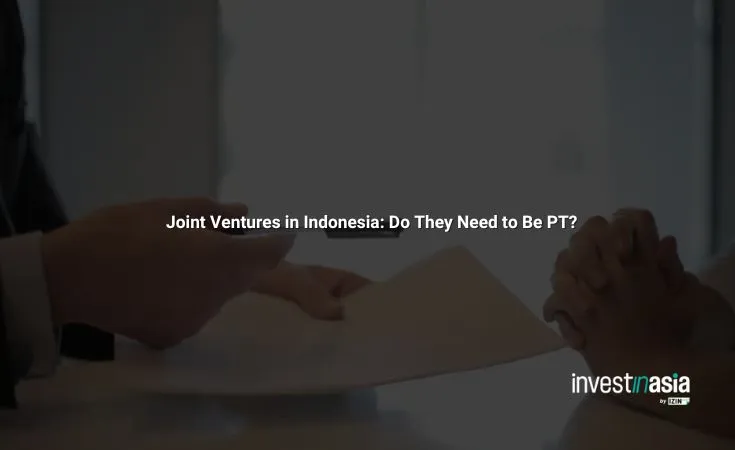The short answer: No, a joint venture in Indonesia does not always have to be a PT (Perseroan Terbatas / Limited Liability Company). However, if foreign investors are involved, the law requires it to be established as a PT PMA. For domestic businesses or short-term projects, alternative structures such as partnerships or contractual joint ventures remain available.
Types of Joint Venture Structures in Indonesia


Joint ventures in Indonesia are broadly divided into corporate and contractual types.
Corporate Joint Ventures
- PT (Limited Liability Company): The most common form, offering limited liability and governance clarity. A PT becomes a PT PMA when foreign shareholders are included.
- Partnerships: Options include Firma (general partnership), CV (Commanditaire Vennootschap) with active and silent partners, and Civil Partnership for joint activities with unlimited liability.
Contractual Joint Ventures
- These arrangements do not create a new legal entity.
- Joint Operations (JO): Common in construction, allowing companies to cooperate temporarily without merging their legal identities.
- Consortia or cooperation agreements: Suitable for specific projects with defined duration.
Also read: The Difference Between PT and CV Companies in Indonesia
When PT Becomes Mandatory
Certain conditions require joint ventures to be structured as a PT:
- Foreign Investment: Any participation by foreign shareholders triggers PT PMA requirements under the Investment Law.
- Industry-Specific Rules: Some sectors only permit PT structures for compliance.
- Construction Projects: Based on Government Regulation No. 5 of 2021, even joint operations involving foreign companies must use PT structures.
Also read: What is Perseroan Terbatas (PT) in Indonesia?
Why Many Choose PT for Joint Ventures


Despite alternatives, PT remains the preferred model because it provides:
- Limited liability protection for shareholders.
- Flexibility in shareholding and governance.
- Regulatory compliance with foreign investment laws.
- Professional management structure through directors and commissioners.
Also read: Complete Guide to Divestment of Foreign Company Shares in Indonesia
Key Considerations Before Choosing a Structure
The right joint venture structure depends on:
- Whether foreign shareholders are involved.
- The sector and applicable regulatory framework.
- The duration of cooperation.
- Liability preferences and risk management.
For long-term, cross-border, or regulated ventures, a PT, especially PT PMA, is the safest and most compliant option.
Also read: The Types of Companies and Business Entities in Indonesia
How InvestinAsia Helps You Register the Right Entity
Navigating Indonesia’s complex business regulations is challenging. Choosing between PT, PT PMA, or other structures requires expert guidance to ensure compliance and efficiency.
InvestinAsia offers end-to-end solutions for:
- Local PT company registration service for domestic ventures.
- PT PMA registration service for foreign-owned companies.
With local expertise and proven experience, InvestinAsia ensures your joint venture is set up legally, efficiently, and ready to operate.
You can also enjoy special package prices for PT PMA and KITAS services.
Ready to start your business and investment in Indonesia? Chat with us now for FREE consultation!
FAQs
Is a PT always required for a joint venture in Indonesia?
No, but it becomes mandatory if foreign shareholders are involved or if the industry requires it.
Can two local companies form a joint venture without creating a PT?
Yes, they may use partnerships or contractual arrangements like joint operations.
What is the benefit of a PT over a partnership?
A PT offers limited liability protection, clearer governance, and regulatory compliance.
Do construction joint operations need a PT?
Yes, since Government Regulation No. 5 of 2021, foreign-local construction JOs must use PT structures.




